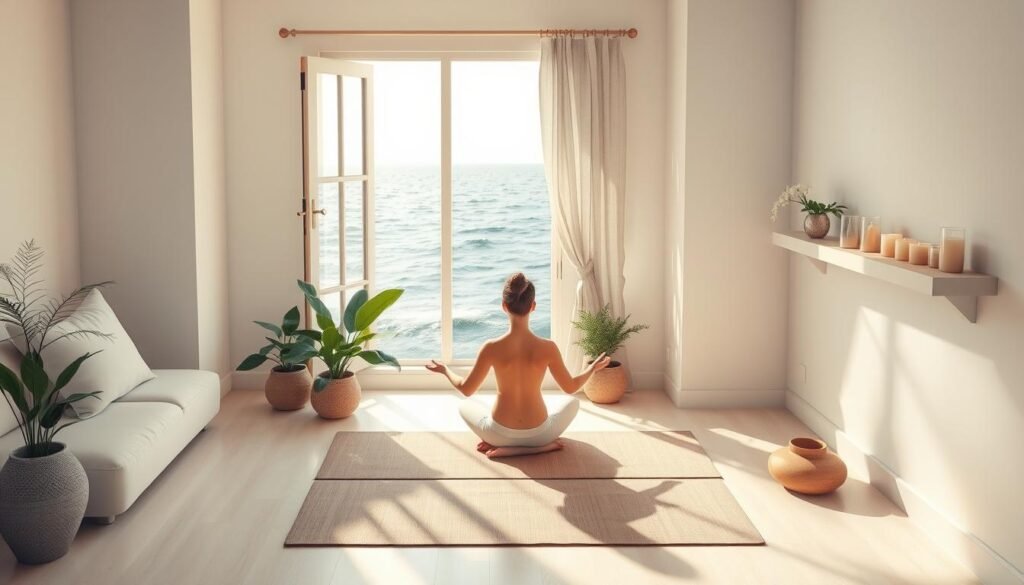We often struggle to relax our minds, even when we try hard. This might be because of low dopamine, an active emotional brain, or a nervous system that won’t calm down. Our daily lives are full of challenges that make it hard to relax and find peace.
By adding relaxation techniques to our daily routine, we can feel better and reduce stress. This can improve our overall well-being.
Studies show that accepting our thoughts and feelings helps us find peace. Not being able to relax can lead to sleep problems, pain, fatigue, stomach issues, anger, trouble focusing, and strained relationships. Understanding the value of relaxation for our mental health is the first step to inner peace and calmness.
Table of Contents
ToggleKey Takeaways
- Relaxation techniques can help improve mental calmness and reduce stress.
- Incorporating relaxation into our daily routine can have a positive impact on our overall well-being.
- Acceptance of one’s thoughts and emotions is an effective strategy for achieving mental peace.
- Regular exercise and mindfulness practices can reduce anxiety levels and improve mood.
- Establishing a daily routine and practicing gratitude can enhance psychological resilience and overall life satisfaction.
- Utilizing a structured environment for work and relaxation can decrease feelings of stress and anxiety.
Understanding Why Your Brain Resists Relaxation
Our brains are wired to respond to stress. This can happen due to our modern lifestyle. Chronic stress or trauma can make it hard for us to relax. Our bodies and minds are connected, so it’s key to understand how to relax.
Studies show that about 70% of people with low dopamine levels prefer excitement over calm. This shows why we need to tackle the causes of mental restlessness. Mindfulness exercises can help us relax and lower anxiety.
- Watching distressing news can increase anxiety and harm our mental health.
- Being a perfectionist can make self-care feel like more work.
- Monitoring heart rate during relaxation can stress some people out.
By knowing these triggers and adding mindfulness to our day, we can start to relax. This can improve our overall well-being. It helps us feel less anxious and better mentally.
The Biological Mechanisms of Stress and Relaxation
Stress triggers our body’s “fight or flight” response, releasing stress hormones like cortisol. This can harm our physical and mental health, causing anxiety, depression, and digestive issues. But, we can calm our minds and reduce stress by understanding how stress and relaxation work.
Meditation practices can activate the brain’s relaxation response, reducing stress and anxiety. Regular meditation, deep breathing, and other relaxation techniques help. By adding these to our daily routine, we can calm our minds and lower stress levels. Useful tranquility tips include:
- Practicing mindfulness and being present in the moment
- Engaging in regular exercise and physical activity
- Getting enough sleep and maintaining a healthy diet
By following these tips and adding meditation to our daily routine, we can lower stress and anxiety. This improves our mental and physical health.
| Technique | Benefits |
|---|---|
| Meditation | Reduces stress and anxiety, improves mood |
| Deep Breathing | Calms the mind, reduces stress hormones |
| Exercise | Improves mood, reduces stress and anxiety |

Join 30,000+ subscribers for exclusive access to our Relaxing tips!
How to Relax My Mind: Essential Techniques for Mental Peace
To find calm and improve mental health, mindfulness is key. Start by setting aside a few minutes each day for relaxation. Studies show that activities like deep breathing, progressive muscle relaxation, and visualization can lower stress and boost mental health.
Relaxation techniques offer many benefits, including:
- Reduced muscle tension
- Improved sleep quality
- Enhanced focus and mood
- Lower blood pressure
- Decreased stress hormone activity
Progressive muscle relaxation is a method where you tense and then relax each muscle group. It can reduce muscle tension by about 30% with regular use. Visualization techniques also help, using your senses to relax, like imagining the smell of salt water and the sound of waves.
By adding these mindfulness practices to our daily lives, we can better our mental health and find peace. Remember, it takes patience and regular effort to see results. With time, we can manage stress better and live a more fulfilling life.
| Technique | Benefits |
|---|---|
| Deep Breathing | Reduces stress levels, improves focus |
| Progressive Muscle Relaxation | Decreases muscle tension, improves sleep quality |
| Visualization | Enhances relaxation, reduces anxiety |
The Connection Between Physical and Mental Relaxation
We often forget how physical and mental relaxation are connected. Activities like yoga or a walk can help calm our minds and reduce stress. These physical actions can lower stress symptoms and improve our life quality, which is great for people with illnesses.
Physical relaxation can also decrease heart rate and blood pressure, which stress affects. Regular use of these techniques can improve blood flow and ease muscle tension. We also see better focus, mood, and sleep with relaxation methods. It’s recommended to practice for 10-20 minutes each day.
Meditation for stress relief is a powerful tool. It can slow down our heart rate, lower blood pressure, and reduce breathing rate. By combining physical and mental relaxation, we can greatly improve our health and happiness. For instance, relaxation can reduce fatigue, anger, and frustration, and boost our confidence in solving problems.
- Reduced fatigue and decreased feelings of anger and frustration
- Increased confidence in managing problems
- Improved digestion and control of blood sugar levels

Making relaxation a priority is the first step to a healthier, happier life. Whether it’s through tranquility exercises, relaxation exercises, or meditation for stress relief, there are many ways to relax. So, let’s take a deep breath and begin our journey to a more relaxed and peaceful life.
| Relaxation Technique | Benefits |
|---|---|
| Yoga | Decreased heart rate, lowered blood pressure, and reduced respiration rate |
| Meditation | Improved focus, mood, and sleep quality |
| Progressive Muscle Relaxation | Enhanced blood flow to major muscles and eased muscle tension |
Creating a Relaxation-Friendly Environment
Mental wellness is closely tied to our surroundings. To find peace and reduce stress, we need a calm environment. This includes the room’s setup, sound, and light. Activities like meditation and deep breathing work better in a quiet space.
When setting up a relaxing area, think about a few key things:
- Keep the room at a comfortable temperature and add cozy touches like heated blankets or soft seats.
- Use calming colors like greens and blues to help you relax.
- Use soft lighting to make the space feel more relaxing, which is helpful in winter.
- Keep the area tidy to improve your ability to relax by up to 40%.
Decluttering and organizing can make your living space more peaceful. Adding plants can also help lower stress and boost your mood. By making your environment relaxing, you can improve your mental health, calm your mind, and reduce stress.
| Environmental Factor | Impact on Relaxation |
|---|---|
| Clutter-free environment | 40% improvement in relaxation |
| Ambient lighting | Improved relaxation, specially in winter |
| Natural elements (plants) | Less stress and anxiety |
By adding these elements and thinking about what we need, we can make a space that supports our mental health. This makes it easier to relax and enjoy calming activities.
Digital Detox: Calming Your Tech-Stressed Mind
We often feel overwhelmed by endless notifications, emails, and social media. This can make us stressed and anxious, making it hard to relax. Anxiety reduction is key for our mental health, and digital detox is a great way to achieve this.
Disconnecting from our devices and taking a break from the digital world helps. We can try meditation, deep breathing, or yoga. These activities calm our minds and lower stress. A study showed that those who did digital detox felt less stressed in the morning and were more focused and productive.
Some benefits of digital detox include:
- Reduced stress and anxiety
- Improved sleep quality
- Increased productivity and focus
- Enhanced feelings of well-being and life satisfaction
Adding digital detox to our daily routine helps us set healthier digital boundaries. It’s as simple as setting device-free hours or making tech-free zones in our homes. By controlling our tech use, we can lower our stress and enjoy more mental relaxation techniques. This leads to a calmer and more relaxed mind.
Mindfulness Practices for Daily Calm
Mindfulness practices can greatly help us find mental calm and lower stress. Adding relaxation techniques to our daily routine helps manage stress better. This improves our overall well-being.
Studies show that mindfulness exercises like meditation and mindful walking help relax and reduce stress. These practices fit easily into our daily lives. They bring mental calmness and help us deal with stress better.
Basic Meditation Techniques
Meditation is a strong tool for finding mental calm. Spending a few minutes each day meditating can lower stress and boost focus. Basic techniques include focusing on breath, body sensations, or a mantra to calm the mind.
Mindful Walking Exercises
Mindful walking is a great way to find mental calm. It involves noticing sensations in the feet, the movement of the legs, and the breath’s rhythm while walking. It’s easy to do anywhere, making it a handy technique for daily life.
Present Moment Awareness Activities
Activities like deep breathing or body scan meditation help us stay present. They reduce stress and anxiety by keeping our focus on the now. This helps us avoid worries about the past or future.
By adding these mindfulness practices to our daily routine, we can boost mental calmness and reduce stress. Regular use of relaxation techniques can lead to a more balanced and peaceful life.

Join 30,000+ subscribers for exclusive access to our Relaxing tips!
Natural Remedies and Supplements for Mental Relaxation
Looking for ways to calm your mind and boost mental health? Natural remedies and supplements can help. Mindfulness practices like meditation and deep breathing work well with these natural methods. They help reduce stress and promote relaxation.
Lavender, chamomile, and valerian root are known for their calming effects. You can drink them as teas, take them in capsules, or use them in aromatherapy. Supplements like omega-3 fatty acids and GABA also support mental well-being and calmness.
Here are some natural remedies and supplements for relaxation and better mental health:
- Lavender: known for its calming effects and ability to reduce anxiety
- Chamomile: a natural relaxant that can help with sleep and stress relief
- Valerian root: a natural supplement that can help reduce anxiety and promote relaxation
- Omega-3 fatty acids: supports mental health and calmness
- GABA: a natural neurotransmitter that helps regulate calmness and relaxation
Remember, natural remedies and supplements are great, but they shouldn’t replace medical care. Always talk to a healthcare professional before trying new supplements. This is important, even if you’re already taking medication or have a health condition.
The Role of Exercise in Mental Calmness
Regular exercise is key for mental wellness. It helps lower stress and anxiety by releasing endorphins, or “feel-good” hormones. Exercise boosts mood, eases mild depression and anxiety, and improves sleep.
Running, walking, and yoga are great for stress relief. They calm the mind and reduce anxiety. Even short walks can help your mental health. The Department of Health and Human Services suggests 150 minutes of moderate activity weekly, in shorter sessions.
Exercise can be done anytime, but morning or evening works best for many. The important thing is to find a routine that fits you. By prioritizing exercise, we can boost our mental health and find peace.
- Reduced stress and anxiety
- Improved mood
- Enhanced sleep quality
- Increased energy levels
- Improved focus and concentration
Adding exercise to our daily routine brings many benefits. Whether it’s a walk, yoga, or gym time, it’s a powerful way to find mental calm and peace.
| Exercise Type | Duration | Frequency |
|---|---|---|
| Brisk Walking | 30 minutes | 5 times a week |
| Yoga | 60 minutes | 3 times a week |
| Running | 15 minutes | 3 times a week |
Nutritional Strategies for a Calmer Mind
Looking into ways to lower anxiety and boost mental calm, nutrition plays a big part. Eating well can help us relax and feel less stressed. For example, foods high in omega-3s, like salmon and walnuts, have been shown to reduce anxiety.
Here are some foods that can help with mental calm:
- Fatty fish, such as salmon and tuna, which are rich in omega-3 fatty acids
- Nuts and seeds, such as almonds and flaxseeds, which are high in healthy fats and antioxidants
- Leafy greens, such as spinach and kale, which are rich in magnesium and other essential minerals
- Fermented foods, such as kimchi and sauerkraut, which support gut health
Drinking enough water and avoiding processed and sugary foods also helps. Adding these foods to our diet can greatly reduce anxiety and improve our mental health.

Remember, everyone’s nutritional needs are different. Always talk to a healthcare professional before changing your diet. Combining a healthy diet with activities like meditation and deep breathing can lead to a calmer mind.
| Foods | Benefits |
|---|---|
| Fatty fish | Rich in omega-3 fatty acids, which can help reduce anxiety |
| Nuts and seeds | High in healthy fats and antioxidants, which can help promote mental relaxation techniques |
| Leafy greens | Rich in magnesium and other essential minerals, which can help reduce stress and anxiety |
Professional Help: When to Seek Expert Guidance
Managing mental health can be tough and complex. Techniques like deep breathing and progressive muscle relaxation help with calmness. But sometimes, you need professional help.
Chronic stress and anxiety can really affect our lives. If not handled, they can lead to serious mental health problems.
About 1 in 5 adults in the U.S. face mental illness each year, says the National Institute of Mental Health. Getting professional help can offer the support needed to manage mental health. Experts like psychologists, psychiatrists, and therapists can help with various therapies.
Some signs you might need professional support include:
- Difficulty managing daily tasks due to stress or anxiety
- Changes in mood or appetite
- Difficulty sleeping or experiencing chronic fatigue
- Physical symptoms such as headaches or stomach problems
By getting professional help, you can learn better ways to relax. You’ll get a plan to manage your mental health and find calm. Remember, taking care of your mental health is key to your overall well-being. Seeking help is a sign of strength, not weakness.
Building Long-Term Relaxation Habits
To get a calm mind and better mental health, you need to build lasting relaxation habits. This means adding mindfulness to your daily life. Regular relaxation can lower stress hormones and make you feel calmer, boosting your mental health.
Here are some ways to make relaxation habits a part of your life:
- Practicing gratitude journaling to focus on the good things in life
- Doing yoga to mix movement, breathwork, and mindfulness
- Keeping a regular sleep schedule for 7-9 hours each night
- Adding physical activity to release happy hormones and lift your mood
By making these habits a daily part of your life, you can better your mental health and find inner peace. Remember, creating lasting relaxation habits takes time and work. But the good it does for your mental health and well-being is worth it.

| Relaxation Technique | Benefits |
|---|---|
| Meditation | Lowers stress hormones, improves mood |
| Yoga | Combines movement, breathwork, and mindfulness |
| Gratitude Journaling | Shifts focus to positive aspects of life |
Overcoming Common Relaxation Obstacles
When we try to relax, we often face obstacles. About 70% of people feel guilty about taking time to relax. This can make stress worse. But, calming exercises can help reduce stress and boost our mood.
Common obstacles include intrusive thoughts, not enough time, and feeling anxious about performing well. Techniques like progressive muscle relaxation, deep breathing, and guided imagery can help. These methods calm our mind and body, making us feel more relaxed.
Studies show that regular relaxation can boost our immune system by up to 50%. This leads to better health. By focusing on mental wellness and doing calming exercises, we can live better and feel more at peace.
Here are some tips to beat relaxation obstacles:
- Start with short relaxation sessions of 5-10 minutes.
- Find a quiet, comfy spot to relax.
- Try guided imagery or meditation apps to keep your mind focused.
By using these tips and techniques, we can beat common relaxation obstacles. This way, we can enjoy better mental wellness and peace of mind.
Understanding and Breaking the Stress Cycle
We often find ourselves stuck in a stress cycle, unable to break free from the anxiety and tension. To reduce anxiety and relax our minds and bodies, we need to understand stress signs and find ways to overcome them. Chronic stress affects about 33% of adults in the U.S., causing mental and physical health problems.
Studies show that mindfulness and relaxation can cut stress by 40%. By adding these techniques to our daily lives, we can relax, reduce stress, and boost our mental health. Some effective methods include:
- Breathing exercises, which have been shown to decrease stress and anxiety levels in up to 90% of participants
- Physical activity, which can lower the risk of developing anxiety and depression by 30%
- Connecting with nature, which can improve mood and reduce feelings of stress by up to 20%
Breaking the stress cycle is the first step towards lasting mental peace and well-being. As we learn about anxiety reduction and mental relaxation, we gain tools to fight stress and find calm.
Adding structured relaxation practices like mindfulness and meditation can boost emotional control and resilience by 30%. By making these practices a daily habit, we can lower stress by 15-30% over time.
| Technique | Effectiveness |
|---|---|
| Mindfulness and relaxation techniques | Reduce stress levels by up to 40% |
| Breathing exercises | Decrease stress and anxiety levels in up to 90% of participants |
| Physical activity | Lower the risk of developing anxiety and depression by 30% |
Conclusion: Your Path to Lasting Mental Peace
Learning relaxation techniques and mental calmness is a journey, not a quick fix. It needs patience and a focus on stress relief. By using mindfulness and digital detoxes, we can improve our mental health and find lasting peace.
Relaxation is a skill that grows with practice. Begin with 5-10 minutes each day and increase as you get better. Studies show that mindfulness meditation lowers stress, anxiety, and depression. It also boosts your brain power. Regular practice helps you face life’s ups and downs with strength and calm.
Your journey to mental peace is personal. Try different methods to see what works for you. Be gentle with yourself as you learn. With effort and kindness, you can calm your mind, reduce stress, and find the peace you seek.
FAQ
What is the science behind mental tension and common triggers for mental restlessness?
We’ll look into how our modern lifestyle affects our minds. This includes the pressure to always achieve and the impact of social media. We’ll also talk about mindfulness exercises to ease anxiety and promote relaxation.
What are the biological mechanisms of stress and relaxation?
We’ll dive into how meditation can calm our minds and bodies. We’ll also cover the importance of understanding stress and relaxation to find effective ways to relax.
What are some essential techniques for mental peace?
We’ll share techniques like breathing exercises and progressive muscle relaxation. These can help calm your mind, improve mental health, and reduce stress and anxiety.
How are physical and mental relaxation connected?
We’ll see how activities like walking or yoga can relax your mind. These can help reduce stress and anxiety.
What factors should be considered when creating a relaxation-friendly environment?
We’ll talk about setting up your room for relaxation. This includes sound, light, temperature, and comfort. A good environment can help you relax, calm your mind, and reduce stress.
How can a digital detox help calm the mind?
We’ll discuss how too much tech can stress us out. We’ll give tips on reducing tech use to promote relaxation.
What are some mindfulness practices for daily calm?
We’ll introduce meditation, mindful walking, and being present. These practices can help you relax, reduce stress, and improve calmness.
What natural remedies and supplements can aid mental relaxation?
We’ll explore natural ways to relax, reduce stress, and improve mental health.
How can exercise contribute to mental calmness?
We’ll discuss the best exercises for stress relief. We’ll also talk about when to do relaxation exercises. Exercise can help you relax, improve mental wellness, and reduce stress.
What nutritional strategies can help achieve a calmer mind?
We’ll look at how a healthy diet can relax your mind. We’ll give tips on adding relaxation-promoting foods to your diet.
When should one seek professional help for mental health issues?
We’ll discuss when to see a mental health professional. We’ll talk about therapy for chronic stress and signs you need help. Seeking help can promote relaxation, reduce stress, and improve mental health.
How can one build long-term relaxation habits?
We’ll share how to make relaxation a part of your daily routine. We’ll give tips on keeping up with relaxation practices. Building these habits can improve mental health, calm your mind, and reduce stress.
How can one overcome common relaxation obstacles?
We’ll discuss overcoming challenges like intrusive thoughts and time constraints. We’ll provide strategies for maintaining a consistent relaxation practice.
How can understanding and breaking the stress cycle help promote relaxation?
We’ll talk about identifying stress signs and breaking the stress cycle. Understanding and breaking this cycle can promote relaxation, reduce stress, and improve mental health.


Pingback: How Do I Turn My Brain Off and Relax? A Complete Guide 2 Men
Pingback: "How to sleep in 2 minutes like Nobita? The Ultimate Sleep H
Pingback: Are Big Eyes Masculine Or Feminine? Understanding Gender Per
Pingback: Does Sleeping With Someone You Love Make You Fall Asleep Faster?
Pingback: How Can I Sleep 8.5 Hours?
Pingback: How Can I Relax My Brain Fast?
Pingback: How Do You Calm Your Mind From Overthinking Quotes? Expert-B
Pingback: What Are Attractive Eyes In Men? What Are Attractive Eyes In
Pingback: How Do I Stop Overthinking Easily?
Pingback: Why Am I An Overthinker?